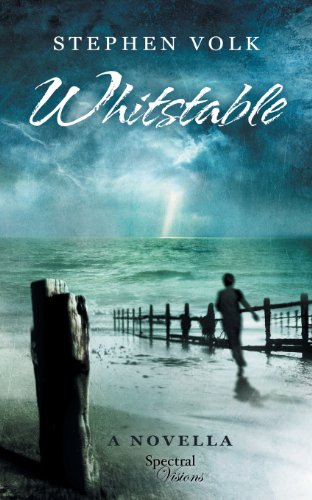Whitstable
Stephen Volk
BOOK REVIEW

In the twilight of British horror, Whitstable emerges as a haunting tribute to the master of macabre, Peter Cushing, intertwining his legacy with the chilling allure of a seaside town. Stephen Volk spins a yarn that is as much about the craft of storytelling as it is a poignant reflection on grief, isolation, and the blurring lines between fantasy and reality.
Set against the backdrop of Whitstable, a quaint coastal town on England's Kentish coast, the novella encapsulates the haunting memories of Cushing, the enduring horror icon known for his roles in classic films like Dracula and Frankenstein. But it's not just an homage; it's a thrilling exploration of the specters that haunt us, both internal and external. With each turn of the page, you are pulled deeper into a world where the past refuses to stay buried, and the ghosts of yesteryear linger like shadows.
Volk's narrative thrusts you into the unsettling events surrounding the seaside town, painted with the poignant brush strokes of nostalgia and dread. The protagonist, wrought with the weight of personal loss, finds himself facing the bitter reality of his own existence, while the town's eerie beauty serves as a fitting canvas for his unraveling. As you delve into Cushing's world-a world marinated in cinematic history and personal mythology-you can almost hear the waves crashing furies against the cliffs, reminding you that nature itself is often as relentless as the horrors we conjure.
Readers have raved about Volk's masterful penmanship, noting how he evokes an uncanny sense of place; his descriptions breathe life into Whitstable, transforming it from a picturesque locale into a character fraught with its own melancholic backstory. Critics have praised how the novella deftly balances elements of horror and poignancy, urging readers not just to witness the unfolding terror but to feel the deep sorrow accompanying it. For many, Whitstable is not merely a horror story; it's a meditation on loss, memory, and the power of storytelling to transcend even the most profound anguish.
However, not all responses are drenched in unbridled admiration. Some readers argue that the novella's slower pacing might test the patience of those seeking brisk thrills. Yet, is it not in these quiet moments of reflection where we often confront our deepest fears? Volk seems to suggest that horror is not always about what lurks in the shadows; sometimes, it's about what we carry within our hearts.
The ripple effect of Cushing's life and career looms large within the text, illuminating the way art can echo through generations. As a child of the 1970s, I recall how Cushing brought terror to life on the screen, yet Whitstable reminds us that the artist's journey was fraught with its own struggles. Here, Volk captures the bittersweet essence of hero worship, seamlessly entwining nostalgia with a modern, psychological lens.
What makes this work truly compelling is its celebration of vulnerability-of a beloved actor wrestling with the demons of his personal life. It's a mirror reflecting the fragility of human existence-a reminder that even the strongest among us have shadows lurking in the corners. As you navigate through Whitstable, you can't help but feel that Volk is whispering a powerful truth: that it is our shared stories, our candid vulnerabilities, that ultimately connects us all.
In exploring themes of identity and legacy, Volk's novella is also a commentary on how collective fear is steeped in personal experience. The emotional landscape of Whitstable resonates far beyond its pages; it poses a challenge to readers to reflect on their own histories while navigating this labyrinth of nostalgia and horror.
As the final pages draw near, you'll sense a paradox-the desire to know what happens next colliding with an inexplicable sadness that this tale must come to an end. Can anything truly prepare you for the emotional impact this story leaves behind? The blending of reality and the unknown, of fear and grief, culminates in an experience that is nothing short of cathartic.
So, whether you're drawn to the tale for its ghostly specters or the deep, existential ruminations it provokes, Whitstable holds a mirror to our innermost fears and desires. The novella is an invitation-a haunting one-that invites you to not just witness a homage to a legend but to reflect upon the shadows that shape our identities. Don't let this captivating journey slip through your fingers; dive into the depths of Volk's creation and emerge with a newfound understanding of the delicate balance between fear and fascination. 🌊✨️
📖 Whitstable
✍ by Stephen Volk
🧾 140 pages
2013
#whitstable #stephen #volk #StephenVolk